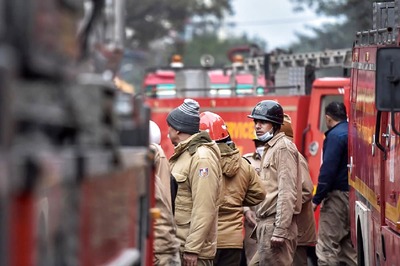
views
Tokyo: Japanese Prime Minister Naoto Kan said on Saturday that it will take decades to clean up and decommission the crippled Fukushima nuclear plant after the world's worst atomic accident since Chernobyl.
Kan's comments marked the first time that Japan's government has offered a timeframe for the clean-up at Fukushima beyond the emergency measures now underway to shut down its reactors.
"It will take three, five, ten years, or eventually several decades to take care of the accident," Kan told local officials from his Democratic Party of Japan meeting in Tokyo.
The Fukushima nuclear plant lost power after the March 11 earthquake and tsunami. Three of the reactors had uranium fuel meltdown, and a series of hydrogen explosions scattered radioactive debris across a wide area.
Some 80,000 people have been forced to evacuate the area around the plant because of the threat from radiation.
With the four-month anniversary of the accident approaching, Japanese officials are due to detail progress in bringing Fukushima under control in the coming days.
Kan, who has pledged a blank-slate review of Japan's energy policy, has been under fire for his handling of the nuclear accident and the government's response to the earthquake and tsunami.
Kan has said he will resign but has not specified when he will step aside, saying he sees it as his responsibility to see through initial recovery work and related legislation.
In a move that raised concern about power shortages stretching into 2012, officials said this week that now-idled reactors would be subject to a safety "stress test" before they would be cleared to restart.
The sudden announcement of stress tests for nuclear plants similar to those conducted by the European Union marked a sharp reversal in course. It also prompted criticism from local officials who complained they had been left in the dark.
Japan's Trade Ministry had been pushing for a quick restart of a reactor at the Genkai nuclear plant in southern Japan. Trade Minister Banri Kaieda signalled this week he would resign, saying he would take responsibility for the confusion at a suitable time.
The "stress tests" are intended to assess whether Japan's remaining nuclear plants could withstand the kind of massive earthquake and tsunami that pushed Fukushima into crisis.
Separately, a government senior official was quoted as saying on Saturday Tokyo Electric Power Co has met a government-set target of setting up a cooling system at the Fukushima plant.
Goshi Hosono, the government minister appointed to oversee Japan's response to the nuclear crisis, told reporters he believed Tokyo Electric had achieved its target of establishing a stable cooling system for the reactors, the first of a series of steps needed to shut down the plant by January.
Efforts to cool the Fukushima reactors currently hinge on a complex and hastily constructed system to decontaminate thousands of tonnes of water being pumped into the reactors and then to circulate it back through the reactors.
Once the cooling system is in place, officials have said that they can focus on work to bring the reactors to a state of "cold shutdown" by January.
At that point, the uranium in the reactor cores would be cool enough so that it would not cause water being pumped in to boil away. It would also mean that there would be little threat from another loss of power to the plant.



















Comments
0 comment